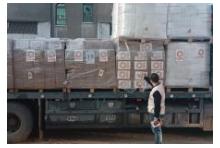CARE: Gaza and Middle East Crisis Fund, Bringing Urgent Relief to an Unrelenting Crisis
op CAREFour months of constant bombardments have inflicted an unimaginable amount of pain and suffering on the people of the Gaza Strip. To date, the war has killed approximately 27,300 people and injured 60,000 – all while the medical system is on the brink of collapse. The number of trucks entering Gaza with humanitarian supplies has been reduced to 20% compared to pre-war levels. The people of Gaza must now make do with 7% of the amount of water supply they had prior to October, and all 2.2 million people in the territory now face the risk of famine.
Our team has defined a four-phase response in the region that seeks to both address the extreme levels of humanitarian need now and support the long-term recovery of affected communities. Our current strategy focuses on addressing the needs of affected families in the Gaza Strip, with some additional programming in the West Bank. As the situation on the ground continues to evolve, we will adapt our strategy and timelines to respond to the context. While we have laid out a basic structure of four chronological phases, there is a high likelihood that phases may overlap or unfold non-linearly depending on humanitarian access to the territory and needs identified by our teams and partners.
In Phase 1, during the first three months of the crisis, we focused on collecting information and preparing for the initial deliveries of humanitarian supplies. In Phase 2, which we anticipate could continue for six to 12 months, we will scale our existing emergency response activities, including provision of critical supplies like water, food, hygiene kits and shelter. In Phase 3, our teams will transition to an early recovery strategy that will begin the process of restoring essential services like water, sanitation, healthcare and electricity, and rehabilitating damaged infrastructure. This transition will depend on a significant reduction in conflict (through a ceasefire or similar development) and an increase in humanitarian access to the full territory. Finally, once the short- and medium-term needs are largely met, Phase 4 will focus on recovery and resilience in a way that can be incorporated into our long-term development work in the Gaza Strip beyond the context of the present crisis i.e. their livelihoods, education, and health.
With the situation growing more dire by the day and no end in sight, we need your help to provide lifesaving assistance to the people affected by this war throughout the region. Months of bombing has reduced Gaza to an “uninhabitable moonscape.” People who survived the bombs now fear that they and their children might starve to death. Overcrowded and unsanitary conditions in shelters and informal settlements of displaced people risk mass outbreaks of preventable diseases and threaten the safety, health and dignity of all.
